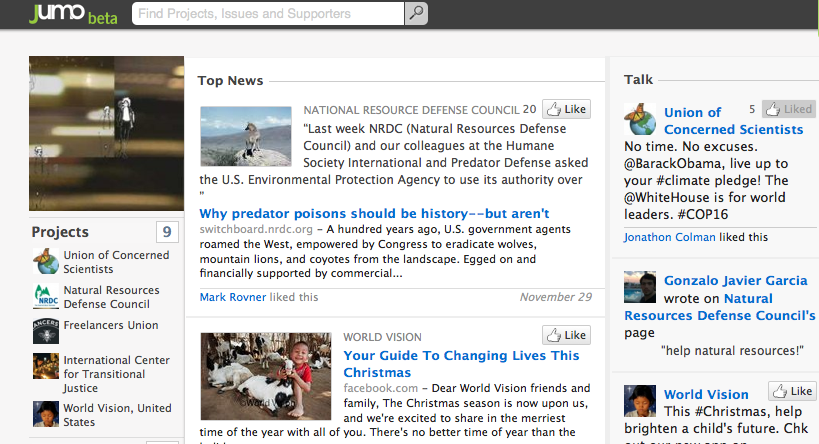 Are niche social networks the best way to mobilize people and channel their energy into supporting nonprofits? Will it turn more people into repeat donors and committed activists?
Are niche social networks the best way to mobilize people and channel their energy into supporting nonprofits? Will it turn more people into repeat donors and committed activists?
In the past couple of years there has been a surge in socially responsible startups such as Crowdrise, Razoo, and Causecast wanting to help to change the world by raising money online for nonprofits. Now Facebook Co-Founder Chris Hughes has launched Jumo in hopes of providing the missing link between people caring about social justice issues and hooking them up with the nonprofits who work on these issues daily. But is developing a platform with a social graph that’s seeded with 3500+ nonprofits, content gathered from Guidestar and newsfeeds and a small donate button  really filling the gap that Hughes was hoping to address? While Jumo has some cool Facebook integration, Twitter-like features and uses an algorithm to suggest projects and issues, many nonprofit campaigners say it needs to do much more to make it a valuable online social community that will lead to a deeper engagement.
really filling the gap that Hughes was hoping to address? While Jumo has some cool Facebook integration, Twitter-like features and uses an algorithm to suggest projects and issues, many nonprofit campaigners say it needs to do much more to make it a valuable online social community that will lead to a deeper engagement.
"Jumo needs to question what makes them different, does the cause marketplace really need them, who will use the platform, and how will it be marketed to them," said Geoff Livingston.
“I don't see Jumo, at least right now, filling a gap,” said Amy Sample Ward of TechSoup Global. “I'd love to see a platform that is focused on action: finding actionable opportunities (Social Actions made great impact here), taking action (helping people find others to do it with them, build trust, form a community, etc.), and then report/display the results of the actions.”
Danielle Brigida, Social Media Manager for the National Wildlife Federation says she’s not sold on Jumo’s platform as a tool to generate more nonprofit supporters. “I'm curious but not sold. I get nervous whenever someone segments off nonprofits in a "community" that promises lots of activists or supporters. The intentions are always good but it is hard to be both meaningful and unique since the space is already crowded.”
Yet Hughes thinks that people seeing a nonprofit name or story flash on the screen when logged into Jumo will lead to meaningful relationships between potential supporters and nonprofits. Is Hughes onto something or does he need to change course?
“Having more people enter the social entrepreneurship space is a good thing. We're all competing to do the most good, so how can that be bad? But Jumo needs to create real community to succeed," said Clint O’Brien of Care2.
What are the best strategies to build community? O'Brien says that to create real impact, it's best not to keep supporters on web portals or to focus too much attention on all the nifty peer-to-peer features such as Facebook provides. "Rather, it's about creating the actual content, and context, to recruit members to go off and join the communities of supporters of nonprofit organizations,” said O’Brien.
"It's the leading nonprofits -- along with some B corporations and other socially responsible for-profits -- that are the champion vehicles for producing long-lasting and sustainable change in the world. They’ve built brands, infrastructure, expertise and credibility, over many years, that makes them much more likely to produce the desired victories for their causes. That’s why almost everything we do at Care2 after a new activist joins -- every eight seconds or so, we’ve calculated -- is geared toward creating the context and rationale for that person to ultimately participate in a nonprofit-sponsored campaign. And then hopefully we can get them to take the extra action of signing up for the email list of those nonprofits that are leading the charge, to advance the causes that the activist cares about,” said O’Brien.
Hughes is a smart entrepreneur. Hopefully, he will listen to the nonprofit community's feedback and adapt Jumo to connect people to nonprofits that truly move people up the ladder of engagement.



COMMENTS